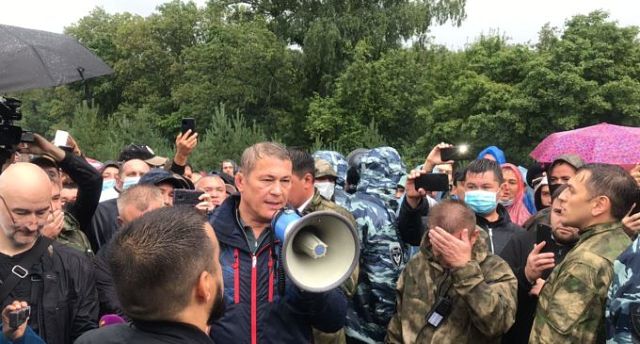The events related to the defense of Kushtau in Bashkortostan are currently in the center of our attention (https://golosislama.com/news.php?id=39084). Why? As we have already mentioned, despite the absence of religious slogans, declarations and names, they have become a rare exception when Muslims, pushed to the periphery of modern Putin’s Russia in terms of its social and political life, found themselves at its center, acting as the vanguard of public interests. However, this situation places a great responsibility and obligation on them and on all of us to act wisely, to learn from the mistakes already made and not to repeat them.
Let us remember how the mass protests in Ingushetia ended. As soon as the people were persuaded to disperse with the promise of negotiations, the repressive machinery kicked in, the leaders of the protest were neutralized, and their supporters were demoralized, allowing the authorities to neutralize them. The same scenario is now visible in Bashkortostan, where their so-called leader (Putin’s deputy) Radik Khabirov, in order to convince the defenders of Kushtau to disperse, promised them negotiations. But the very next day it became clear who would take part in these negotiations and what would happen to those excluded from them.
Only people selected by the authorities, who were convenient and compliant, were invited to the negotiations, while the real defenders of Kushtau were denied the right to participate. The most active representatives of the latter immediately began to be prosecuted – from administrative arrests to fines – for mass disorder, while the organizers of the authorities who threw armed militants at the people were not punished. Now Khabirov is trying to develop an initiative, declaring that the republic intends to buy a controlling stake in BSC, which wants to destroy Mount Kushtau, without coordinating this decision with experts or the public, considering its cost to the republic.
We have often criticized Alexei Navalny in the pages of “Golos Islama”, but it must be acknowledged that against this background it is precisely a woman – the head of his headquarters in Bashkortostan, Lydia Chanysheva – who has taken the clearest and most courageous position. She writes: “There is no need to meet with Khabirov at all. He is a professional swindler. All these meetings and ‘negotiations’ are a distraction from the problem. Now he will deceive everyone. And he is afraid of the streets. Our demands have been made. Let them be fulfilled. There is no need for negotiations here – we have nothing to give up to reach a ‘compromise’. We demand the release of the detainees, the cancellation of the construction license, the designation of Kushtau as a specially protected natural area, the inclusion of the mountain in the “Bashkir Shikhans” project, and a ban on the development of all Shikhans. We also demand the prosecution of those who destroyed the camp and beat the defenders of Kushtau”.
It is clear that the psychology of a normal person is such that he will strive to resolve any conflict through negotiation and compromise, if such an opportunity exists. However, one must understand the difference between negotiation and deception, and between compromise and surrender. The experience of a large number of situations teaches us that the ruling circles of this country have a criminal mindset and view their people as either submissive or fools with whom they can either do whatever they want as long as they tolerate it, or when their patience runs out and they begin to rebel, they neutralize and disable them through a combination of carrots and sticks. It is impossible to outsmart them in this area. The vicious circle of endless tolerance and manipulation can only be broken by breaking the system itself and creating a new one – in which everyone in power or aspiring to power is dependent on civil society, which brings leaders to power through free and competitive elections and, if necessary, removes them by the same means.
In Ingushetia and Bashkortostan, the people’s problems stem precisely from the lack of real choice and real competition for power. The protests in Khabarovsk and Belarus are also rooted in this. Individually, however, none of them has a chance, at least in the so-called Russian Federation, which is no longer a federation. As long as the protesters, one by one, allow themselves to be manipulated and controlled, the bandits in power will continue to manipulate them like fools. It is necessary not to give the initiative to the authorities, but to take advantage of the rise of popular energy, to translate the protests into the political sphere and to give them an all-Russian character. In these all-Russian protests, Muslim civil activists from regions such as Bashkortostan, Ingushetia, and others must make themselves known and demand that their colleagues in the opposition take into account Islamic specifics and interests, both locally and at the level of the (future) federation.

